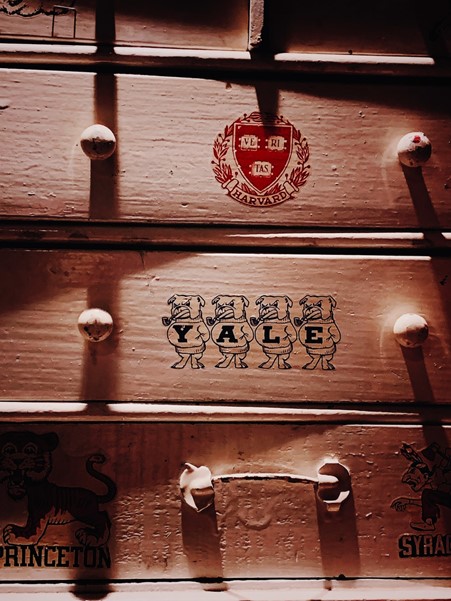At the British Labour party conference in September 1999,
a little-known politician by the name of “Tony Blair” announced a seemingly radical goal for the new Millennium: “Today I set a target of 50 percent of young adults going into higher education in the next century” he informed shocked delegates. There were quiet scoffs. “Yeah, right,” someone whispered. “Bloody Tony and his weird ideas.” A man in the second row checked his watch. “I’ve got better things to do than bully some yobs onto University Challenge.” The moment had come, he decided, to heckle this hapless unknown. Besides, Tony’s vibes were all wrong; he’d seen him at that Downing Street party two years ago, Jack-Nicholson-in-The-Shining smile and manners so greasy he’d nearly drowned Noel Gallagher in Vaseline. The issue was clear; Tony had a self-respect problem. “50 percent” of kids in Higher Ed? Sure thing, mate. Whatever.

Copyright: John Tyson
Tony wasn’t all bad, though. Granted, his policies were a little off sometimes, but so what? Nobody was getting hurt. At least he hadn’t done anything really wild like invade Iraq. With all that in mind, the soon-to-be heckler muttered a last “carpe diem” and rose from his seat. They should really have hired somewhere larger than a primary school assembly hall, he thought. Ah, well. All eyes turned upon this Judas; he began to sweat. Tony had stopped talking and regarded him with an almost fearful disdain. Let them stare, the mutineer decided. He’d been there when Neil Kinnock had fallen into the sea; he could handle this. Like university education actually mattered? My God, Tony was deluded. The renegade readied himself to ask the question that was really on everybody’s lips, a current issue that had neither colour nor creed, gender nor class. The thing that loomed large over civil society with increasingly malevolent gall, that held the very balance of life as everybody knew it in its pixelated claw. Without so much as a waver, a shot rang out in the silent hall. “Say, Tony! Talk about the serious stuff, man- What are we going to do when all our computers simultaneously combust on New Year’s Day?”
Of course, we all know how this story ends. Millennium Bug hysteria passed about as quickly as a New Year’s Day hangover. “Tony Blair”, meanwhile, vanished without trace, though he went on to achieve minor infamy after his apprehension by the French coastguard for biting somebody’s ankle on a Dover-to-Calais passenger ferry, later claiming diplomatic immunity to avoid prison-time in France. Most importantly of all, under no circumstances was he ever Prime Minister of the United Kingdom. You’d be justified in thinking, then, that Tony’s dream died with his thoroughly unremarkable political career; you’d be wrong. Because in 2018, nearly 20 years after announcing his hopes for the next thousand big-ones, 50.2 percent of British high schoolers scored a place at university. Our continental cousins have been similarly successful; higher education rates in Germany haven’t dipped below 55% since 2011, with numbers in Italy and France on the rise, too. The question then, is what this has to do with us at Harthcommunications. After all, we’re…corporate-y. And we’d be the first to admit: it’s hard to be down with the kids when the only ‘Tiktok’ we understand comes in either analogue or digital.
(I’m joking. We’re hip. No, really. We are. Promise.)

Copyright: Vadim Sherbakov
All kidding aside, the purpose of this little story is twofold: the first is to demonstrate that I am, in fact, a pathological liar. The second is to draw attention to the very real issue of competition and the unfortunate role it plays in continuing to disadvantage those who have only recently been offered the opportunity to attend university. Think about it: kids from low-income backgrounds are more likely to enter into higher education now than ever before. Which is brilliant. The problem, however, lies with the goalposts; when new players enter the pitch, the powers-that-be recalibrate the field. Likewise, when only those with money made it to university, it was enough to have good grades. Now that teenagers from both sides of the wealth-divide are scoring Higher Ed places, competition becomes tighter and candidates need something more to distinguish them from the great identity-parade of Academically Unimpeachable And Very Unexciting eighteen year olds dragged before admissions boards each year. For those who can afford it, that’s a summer internship with the House of Lords. For everyone else, it’s a mad dash to the library to read the first and last ten pages of anything by J.J. Rousseau so you can inform the tutors at Oxford that, yes, you do have a passion for Romantic era French philosophy, and no, you won’t elaborate on it until there’s a scholarship to Christ Church in the post.
And we still wonder why the best universities are dominated by those with elite level wealth? Whilst getting as many kids as possible into Higher education is admirable in theory, in practice there’s still much to be done in addressing how students’ financial situation dictates where they study and how far they’ll take their academic career. That’s where we come in: if a candidate can’t fight the system, the very least they can do is tip the scales in their favour. The best way to do that? Owning their Story.
Shocker.

Copyright: Reinhart Julian
This time, however, we mean it. Here are three good reasons why, no matter your background, Owning your Story can make the university admissions process work for you:
1. You’re playing the university at its own game (and maybe even winning):
Remember when you applied to university and the admissions board asked you what your parents did for work? And all your rich friends ended up at Oxbridge, whilst you, well… you didn’t? Just me? No sir, I’m not bitter. The truth, however, remains: if family income is something you worry might be used against you when it comes to applying for elite universities, the best thing you can do is Own your Story and mention it first. Though the odds may still be against you, there’s a greater kind of integrity in taking ownership of who you are and where you come from. As anyone from a low-income background will tell you, there’s an ugly narrative surrounding poorer communities: that, because you grew up with less money, you are “disadvantaged”, see: ‘lesser than’. It suggests childhood rupture; that it was ‘in spite’ of everything that you did well at school, not ‘because’ of it. Owning your story means that you take control of the narrative and make it clear that your experiences have enriched your capacity for learning. It’s the tireless efforts of those around you that push you to succeed, not the arbitrary sway of how much cash you can cough up when some university don needs his palm greasing. If people ask you about it, tell them. Mention your background in your personal statement. Let them know that you know. Owning your Story is about taking pride in your roots- turn your back on the pious presumption that you’ve “overcome your struggles” to get where you are today- let’s fly free from offers of sympathy that just don’t apply.

Copyright: Matteo Vistocco
2. You’re recognising your skills, because…damn, you’re good!:
The secret’s out: you have it. You’re going to university, and wherever it is you find yourself, take pride in the fact that “you” made it happen. There’s no doubt about it: you’ve got the skills to take that final step and make it all the way to campus. First, however, is the small matter of your personal statement: there’s something almost low brow in blowing your own trumpet, in telling the world, “Look what I can do!”. What university admissions boards want to see, however, is acknowledgement of the talents you’re too scared to commit to paper. Owning your Story means that you ignore the stomach bile resurfacing in disgust at your own rampant narcissism and take it for what it is: show whoever’s reading just how much you deserve that university place. Owning your Story means that you quit being afraid of your skills, whilst asking for the opportunity to learn some new ones. You want to give admissions boards no question as to who it is they’ve just met. Owning your story can help you do that. (And if you’re still struggling, we might just know what to do…)
3. When the competition’s hot, you’ve got to be cool:
This one doesn’t take much explaining. As we said before: when potentially hundreds of candidates are fighting it out for only a couple of university places, it pays to make yourself memorable. Whether you Own your Story by taking control of your narratives, or you list skills like they’re going out of fashion, it’s crucial to operate with the smooth assurance of someone who knows they’re worth it. Kids are notorious for their lack of subtly; 9 out of 10 personal statements are so tightly wound that they’ll turn to dust if you so much as look at them the wrong way. People really want to make it to the university of their dreams; so do you, but Owning your Story means that you don’t fall back on the desperate begging that characterises so many unsuccessful admissions. To Own your Story is to walk the line between audacity and cold, hard facts: give your personal statement a firmness beyond the classic, “I’ve wanted to be a doctor since my brother accidentally overdosed on Pepto Bismol and I spent fourteen hours reading ‘That’s My Spleen’ medical magazine in the hospital waiting room.” It’s cute, but it doesn’t win. Owning your Story means that you’re sure enough of your own talent to avoid pleading, but not so aloof as to seem like you don’t care if you make it to interview or not.

Copyright: Alex Motoc
See how Owning your Story makes a difference? Told you. Now, we admit that these little tricks won’t fix everything; there are greater, more systemic issues at play within the university admissions process that only those inside it have the power to change. But in the meantime, all you can do is maximise your chances of scoring big. And there’s no better way to do that than to Own your Story, take back control of your narratives, and let people know who you are before they decide for themselves. Remember, it’s a dirty game, but if everybody’s playing it, then so should you. And if you can walk away knowing that you showed everybody what it means to take pride in who you are and where you come from, then you’re a student at the University of Life, which…sounds incredibly corny and unofficial. You get what we mean. Your diploma’s in the post.
(Author: Anna Hanlon)
(Editor’s note: At the behest of Mr. Blair’s legal team, Harthcommunications wishes it to be known that the incident described at the beginning of this article was merely a satirical take on Mr. Blair’s legitimate and longstanding campaign to improve access to higher education for all school leavers in the United Kingdom. Furthermore, after liaising with the French coastguard, we hereby assert that Mr. Blair is not, and nor has he ever been, involved in any form of cannibalising activity on the Dover-to-Calais passenger ferry. The same, however, cannot be said for Boris Johnson.)




